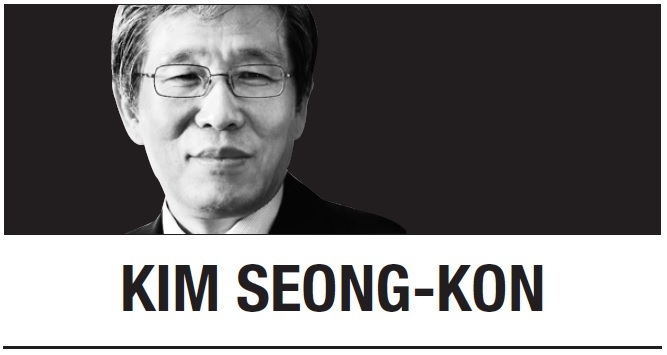
Recently, US President-elect Joseph Biden announced, “I’m telling world leaders that America is back.” In response, world leaders applauded his message, saying, “Welcome back, America.” As America is back, we might as well ponder, “What can we expect from America and what lies ahead of us in the Biden era?”
At his memorable victory speech in Wilmington, Delaware, President-elect Biden promised several things in response to the complex problems America faces and that he thought were incumbent upon us to solve quickly. Among others, Biden said that he would cure a divided America and embrace both sides. Indeed, America needs to heal her psychic wounds caused by the mutually antagonizing bipolarity of liberals vs. conservatives, blue states vs. red states, and globalists vs. nationalists. In the eyes of foreigners, America remains divided sharply and radically, as if she faced another civil war. Thus, Biden pledged that he would be “a president who seeks not to divide, but to unify, who does not see red and blue states, but a United States.”
Acknowledging his debts to his supporters, the president-elect emphasized a new rainbow coalition. He said, “I am proud of the coalition we put together, the broadest and most diverse in history. Democrats, Republicans, and Independents. Progressives, moderates, and conservatives. Young and old. Urban, suburban, and rural. Gay, straight, transgender. White, Latino, Asian, Native American.” Then he singled out the importance of the African American community in our contemporary moment. He pointed out that colorful diversity is what represents the true idea of America.
Biden also assured the audience that he would do his best to restore the decency and respect America has lost lately in the international community. He said he would “seek to restore the soul of America” and “rebuild the backbone of the nation,” that is, the middle-class. He added that he would bring back normalcy to American society and serve the nation and the people of America in light of his democratic vision.
In accordance with his vision, his administration has already shown two promising and encouraging emblems. One is Vice President-elect Kamala Harris, whom Biden praises as “the first woman, first black woman, first woman of South Asian descent, and first daughter of the immigrants ever elected to the national office in this country.”
The other one is the first lady Jill Biden who is a professor of English. Since she is well aware of the problems of education and the crisis of the Humanities, she will be an excellent adviser to the president concerning those issues. Many students and scholars in the humanities are pleased to have such an academic first lady and look forward to a Renaissance of the Humanities thanks to her concern and endeavors.
Biden’s speech strongly appeals to many Koreans who deplore the lamentable situation of South Korea, also sharply divided by two antagonizing groups. Like America, South Korea, too, needs to heal her psychic wounds, restore her soul, and regain the respect of the international community.
As American is back, South Korea should be ready for the new Biden era. In a presidential debate, Biden made it clear that unlike his predecessor, he will not be a good friend of the North Korean leader. Some people worry that Biden might follow Obama’s “strategic patience,” and yet Biden will be definitely much tougher than Obama because he now knows that “strategic patience” has only allowed North Korea to build nuclear missiles that threaten the US mainland.
Some Korean politicians seem to believe that since Biden supported the Sunshine Policy when he met President Kim Dae-jung in 2001, he will support South Korean politicians’ strenuous effort to help North Korea financially again. However, things have changed considerably since then. Now North Korea has nuclear weapons, presumably enabled by the Sunshine Policy. Therefore, it would be presumptuous if Korean politicians expected or asked Biden to follow his previous policy toward North Korea.
In the Biden era, America’s pressures on China and North Korea will be much tougher than ever before, as he and his Democratic Party will definitely bring up human rights issues in addition to trade, democracy, and territorial matters. Biden, despite his gentle and mild image, will not allow tyrannical nations to threaten world peace. He will not be interested in political shows, either.
Meanwhile, since Biden values the Korea-US alliance, he would not pull out US troops from Korea, which is vital for Korea’s national security. To Biden, American soldiers are not mercenaries but peacemakers for protecting democracy. Therefore, he would not ask for an astronomical amount of money for stationing US troops in Korea.
In the Biden era, South Korea will no longer be able to hide behind the strategic ambiguity between China and the United States and will have to choose one of the two. Which one shall we choose between our indispensable, but overbearing business partner and our blood-ally, who is also our valuable long-term business partner? The decision will decide the future of Korea. We must choose wisely.
Kim Seong-kon
Kim Seong-kon is a professor emeritus of English at Seoul National University and a visiting scholar at Dartmouth College. -- Ed.



![[Today’s K-pop] Blackpink’s Jennie, Lisa invited to Coachella as solo acts](http://res.heraldm.com/phpwas/restmb_idxmake.php?idx=644&simg=/content/image/2024/11/21/20241121050099_0.jpg)




